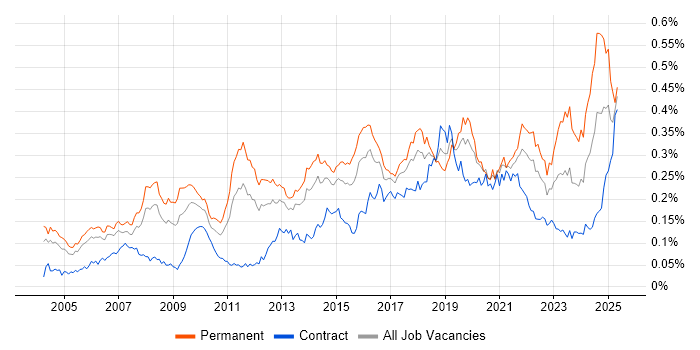Statistical Modelling
England > London
The table below provides summary statistics for permanent job vacancies advertised in London requiring Statistical Modelling skills. It includes a benchmarking guide to the annual salaries offered in vacancies that cited Statistical Modelling over the 6 months leading up to 18 May 2025, comparing them to the same period in the previous two years.
| 6 months to 18 May 2025 |
Same period 2024 | Same period 2023 | |
|---|---|---|---|
| Rank | 333 | 453 | 536 |
| Rank change year-on-year | +120 | +83 | +38 |
| Permanent jobs citing Statistical Modelling | 62 | 56 | 94 |
| As % of all permanent jobs advertised in London | 0.48% | 0.24% | 0.28% |
| As % of the Processes & Methodologies category | 0.50% | 0.26% | 0.29% |
| Number of salaries quoted | 45 | 37 | 63 |
| 10th Percentile | £57,500 | £47,500 | £41,250 |
| 25th Percentile | £65,000 | £52,500 | £55,500 |
| Median annual salary (50th Percentile) | £75,000 | £80,000 | £68,823 |
| Median % change year-on-year | -6.25% | +16.24% | +5.88% |
| 75th Percentile | £100,000 | £95,000 | £82,500 |
| 90th Percentile | £126,250 | £100,000 | £94,750 |
| England median annual salary | £60,000 | £57,500 | £50,000 |
| % change year-on-year | +4.35% | +15.00% | -16.67% |
All Process and Methodology Skills
London
Statistical Modelling falls under the Processes and Methodologies category. For comparison with the information above, the following table provides summary statistics for all permanent job vacancies requiring process or methodology skills in London.
| Permanent vacancies with a requirement for process or methodology skills | 12,445 | 21,520 | 32,059 |
| As % of all permanent jobs advertised in London | 96.16% | 90.99% | 95.36% |
| Number of salaries quoted | 7,282 | 15,899 | 23,123 |
| 10th Percentile | £42,000 | £37,500 | £43,180 |
| 25th Percentile | £55,813 | £51,500 | £55,000 |
| Median annual salary (50th Percentile) | £75,000 | £70,073 | £75,000 |
| Median % change year-on-year | +7.03% | -6.57% | +7.14% |
| 75th Percentile | £100,000 | £95,000 | £95,000 |
| 90th Percentile | £122,500 | £115,000 | £115,000 |
| England median annual salary | £57,500 | £55,000 | £62,500 |
| % change year-on-year | +4.55% | -12.00% | +4.17% |
Statistical Modelling
Job Vacancy Trend in London
Job postings citing Statistical Modelling as a proportion of all IT jobs advertised in London.

Statistical Modelling
Salary Trend in London
3-month moving average salary quoted in jobs citing Statistical Modelling in London.
Statistical Modelling
Salary Histogram in London
Salary distribution for jobs citing Statistical Modelling in London over the 6 months to 18 May 2025.
Statistical Modelling
Job Locations in London
The table below looks at the demand and provides a guide to the median salaries quoted in IT jobs citing Statistical Modelling within the London region over the 6 months to 18 May 2025. The 'Rank Change' column provides an indication of the change in demand within each location based on the same 6 month period last year.
| Location | Rank Change on Same Period Last Year |
Matching Permanent IT Job Ads |
Median Salary Past 6 Months |
Median Salary % Change on Same Period Last Year |
Live Jobs |
|---|---|---|---|---|---|
| Central London | +45 | 35 | £75,000 | -25.00% | 13 |
| Statistical Modelling England |
|||||
Statistical Modelling
Co-occurring Skills and Capabilities in London by Category
The follow tables expand on the table above by listing co-occurrences grouped by category. The same employment type, locality and period is covered with up to 20 co-occurrences shown in each of the following categories:
|
|
|||||||||||||||||||||||||||||||||||||||||||||||||||||||||||||||||||||||||||||||||||||||||||||||||||||||||||||||||||||
|
|
|||||||||||||||||||||||||||||||||||||||||||||||||||||||||||||||||||||||||||||||||||||||||||||||||||||||||||||||||||||
|
|
|||||||||||||||||||||||||||||||||||||||||||||||||||||||||||||||||||||||||||||||||||||||||||||||||||||||||||||||||||||
|
|
|||||||||||||||||||||||||||||||||||||||||||||||||||||||||||||||||||||||||||||||||||||||||||||||||||||||||||||||||||||
|
|
|||||||||||||||||||||||||||||||||||||||||||||||||||||||||||||||||||||||||||||||||||||||||||||||||||||||||||||||||||||
|
|
|||||||||||||||||||||||||||||||||||||||||||||||||||||||||||||||||||||||||||||||||||||||||||||||||||||||||||||||||||||
|
|
|||||||||||||||||||||||||||||||||||||||||||||||||||||||||||||||||||||||||||||||||||||||||||||||||||||||||||||||||||||
|
|
|||||||||||||||||||||||||||||||||||||||||||||||||||||||||||||||||||||||||||||||||||||||||||||||||||||||||||||||||||||
